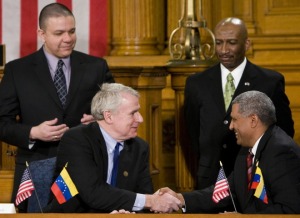
Today there was an exciting development in public diplomacy that brought two communities together: the Venezuelan city of Carora and Milwaukee, Wisconsin. These two places have teamed up to build connections through cultural, educational, and economic activities. Notably, it is the first Sister City agreement made between the U.S. and Venezuela in ten years.
The Sister City program allows citizens from the two countries to unite on a local level, which helps build cross-cultural understanding. It can also add a human element to political realities.
Milwaukee Mayor Tom Barrett said:
Our leaders of our representative countries have not had the warmest relations and that makes what we are doing today more important. If leaders don’t see eye to eye that doesn’t keep individuals from working together. Political leaders come and go, but at the local, grass-roots level there’s still the ability as human beings for us to make the world better.
City officials are looking forward to sharing ideas on issues such as water, dairy production and coffee exchange. Carora is creating a welcome house for visitors from Milwaukee where they can learn about the city’s rich heritage. It is in fact one of the oldest colonial cities on the South American continent, founded for the first time in 1569.
Considering the cold temperatures in Wisconsin, Milwaukee’s new sister will likely attract her share of snowbirds next winter!
Stay tuned for updates.

 Because its economy based largely on natural resource exports, Venezuela faces particular challenges with regard to environmental sustainability. How can a country draw on the Earth’s riches while ensuring their long-term availability?
Because its economy based largely on natural resource exports, Venezuela faces particular challenges with regard to environmental sustainability. How can a country draw on the Earth’s riches while ensuring their long-term availability? Last month, Venezuela banned trawling, a method of netting fish that had a devastating affect on marine life. The move to end trawling will help protect fragile fish populations and seabeds. Small fishers are celebrating the decision as a boost to their livelihood.
Last month, Venezuela banned trawling, a method of netting fish that had a devastating affect on marine life. The move to end trawling will help protect fragile fish populations and seabeds. Small fishers are celebrating the decision as a boost to their livelihood.
